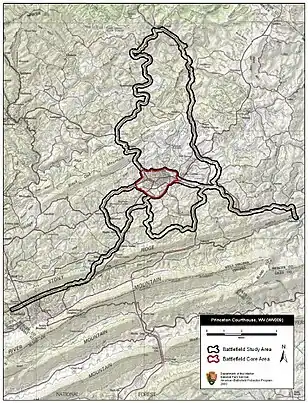| Battle of Princeton Court House | |||||||
|---|---|---|---|---|---|---|---|
| Part of the American Civil War | |||||||
| |||||||
| Belligerents | |||||||
|
|
| ||||||
| Commanders and leaders | |||||||
| Jacob Dolson Cox | Humphrey Marshall | ||||||
| Units involved | |||||||
| Kanawha Division |
Army of East Kentucky Department of Southwest Virginia | ||||||
| Casualties and losses | |||||||
|
113 total 23 killed 69 wounded 21 missing |
16 total 4 killed 12 wounded [1] | ||||||
The Battle of Princeton Court House was fought May 15–17, 1862 in Mercer County, Virginia (now West Virginia) in conjunction with Stonewall Jackson's Valley Campaign.[2] It was a minor victory for the Confederate States Army.
Background
By early May 1862, Union forces were positioned to invade Virginia at two places. Brig. Gen. Robert H. Milroy's column, its axis of march the Staunton-Parkersburg Turnpike, advanced from Cheat Mountain and occupied in succession Camp Allegheny, Monterey, McDowell, and Shenandoah Mountain. Retreating before the oncoming Federals, Confederate Brig. Gen. Edward "Allegheny" Johnson pulled back to Westview, six miles west of Staunton.
Order of Battle
Union Forces - Gen. Jacob D. Cox
- Simmonds' Battery Kentucky Light Artillery
- 28th Ohio Infantry Regiment
- 34th Ohio Infantry Regiment
- 37th Ohio Infantry Regiment
- 2nd West Virginia Cavalry (detachment)
Confederate Forces - Gen. Humphrey Marshall
Battle

Union soldiers of Brig. Gen. Jacob D. Cox's District of Kanawha threatened the Virginia and Tennessee Railroad. By mid-May, the Federals, although ousted from Pearisburg, held Mercer County and braced for a lunge at the railroad. Confederate Brig. Gen. Humphrey Marshall arrived from Abingdon, Virginia, with the Army of East Kentucky.
Seizing the initiative, Marshall bested Cox's 1st and 2nd brigades during three days of fighting, May 15 to May 17, in Mercer County, centering on Princeton Courthouse. There were 129 casualties in total.
Aftermath
Breaking contact with the Confederates on the night of May 17, Cox withdrew 20 miles (30 km). Col. George Crook, commanding Cox's 3rd brigade, marched to and occupied the city of Lewisburg, where on May 23 he defeated Brig. Gen. Henry Heth's larger brigade in the Battle of Lewisburg. Crook withdrew upon learning that Thomas J. "Stonewall" Jackson's army had routed a Union division at Winchester on May 25.
References
- ↑ Incomplete. There is a report from Marshall, but none from Wharton
- ↑ "Battle Summary". National Park Service. Retrieved 15 May 2016.
Further reading
- Cox, Jacob Dolson (1900). Military Reminiscences of the Civil War Volume I - April 1861-November 1863. New York, New York: Charles Scribner's Sons. ISBN 978-3-84951-384-9. Retrieved 2021-05-12.
- Johnston, David E. (1906). A History of Middle New River Settlements and Contiguous Territory. Huntington, West Virginia: Standard Printing and Publishing Co. OCLC 1029855740. Retrieved March 25, 2022.